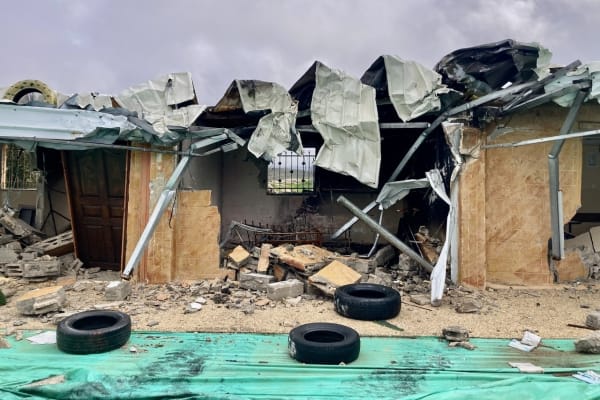From fringe figures to shadow power
Fanatical settlers take over West Bank and Israeli army
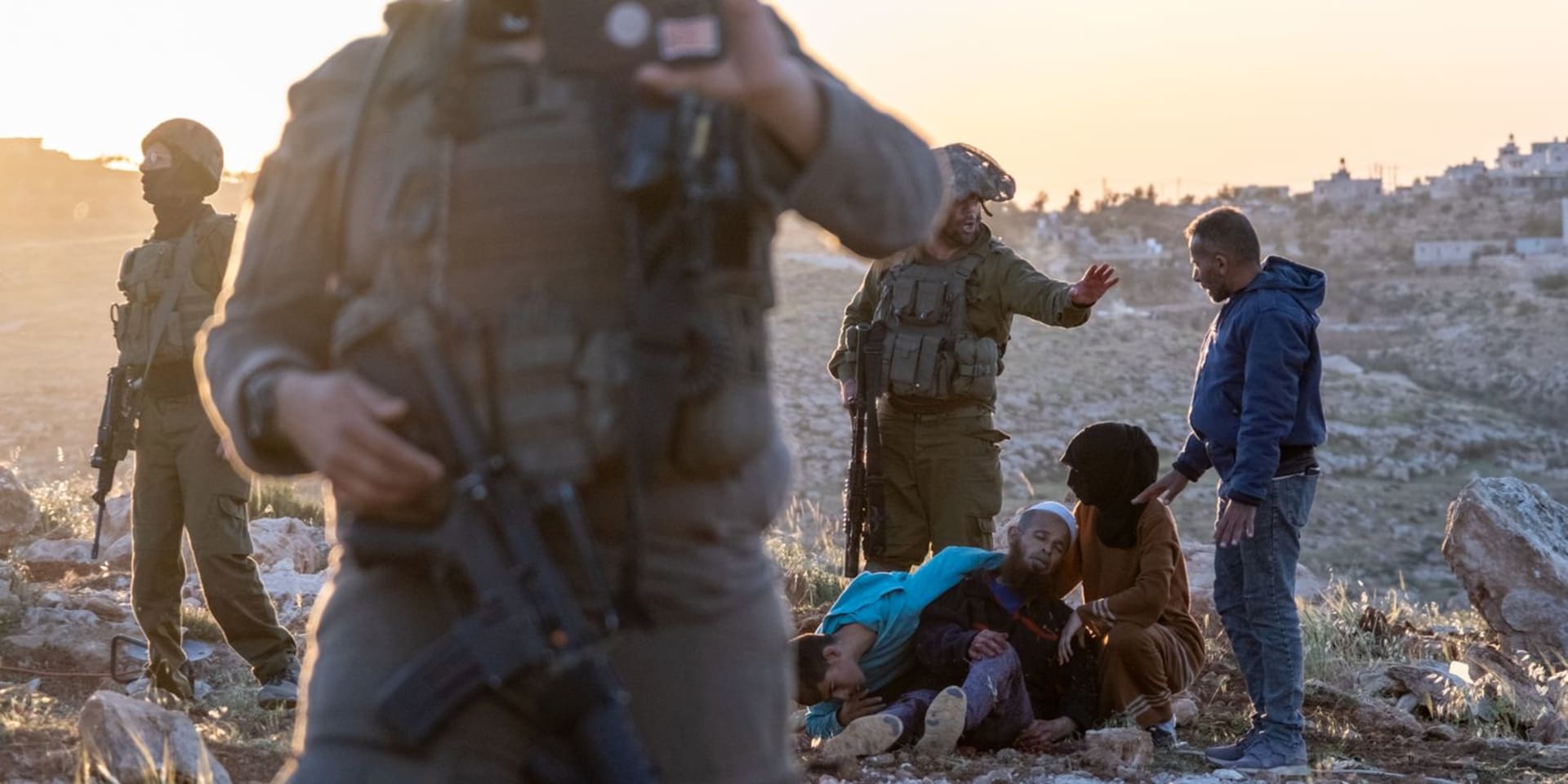
Sheikh Saeed lies bleeding in his olive grove with son Elias (bright blue sweater)
© Aidan Frere-Smith

Sheikh Saeed lies bleeding in his olive grove with son Elias (bright blue sweater)
© Aidan Frere-Smith
While all eyes are on Gaza, ultra-nationalist settlers are taking advantage of the lull to take over the West Bank for good. ‘The armed militias are taking not only the West Bank, but also Tel Aviv.’
This article was translated from Dutch by kompreno, which provides high-quality, distraction-free journalism in five languages. Partner of the European Press Prize, kompreno curates top stories from 30+ sources across 15 European countries. Join here to support independent journalism.
On Thursday evening, April 17, 60-year-old Sheikh Saeed Rabaa repairs the border wall at his olive grove near the Palestinian village of Tuwani, in the Masafer Yatta hills. A few days earlier, Israeli settlers from the nearby settlement of Avigail demolished the wall to encroach on the land.
It is already dusk when Sheikh Saeed suddenly sees three armed settlers looming on his property. This time with stakes and an auger, apparently to demarcate Saeed’s orchard for themselves.
When Saeed’s 16-year-old son Elias hears tumult, he immediately runs outside to film the incident. The teenager recognises the leader of the intruders: Binyamin ‘Boudi’ Bodenheimer, Avigail’s heavily armed security coordinator.
‘Boudi kept my father at bay with his machine gun, while younger settlers further away were pounding poles on our land’, Elias told MO* a few days later. ‘When they saw me filming, one of the settlers grabbed me from behind, threw me to the ground and hit me while taking away my phone.’
Then things escalated with lightning speed. When Sheikh Saeed rushes over to protect his son, Bodenheimer fires first in the air and immediately afterwards in Saeed’s right leg.
As the father lies bleeding in the earth of his olive grove, the son is restrained screaming by the other settlers, who push his head against the ground. ‘One of the men sat on top of me and hit my arm with a stone. Boudi was filming everything laughing and meanwhile kicking sand in my face with his feet’, Elias says doggedly.
Meanwhile, a crowd of local residents and international solidarity activists rushed to offer help. But the armed men keep everyone at bay. No one is allowed near the injured Saeed.
Soon dozens of armed settlers and Israeli soldiers also arrive at the scene. Tuwani is in Area C, occupied Palestinian Territory under Israeli control. Here, Palestinians can only rely on Israeli services for law and order.
‘When the soldiers arrived, they told the settlers to leave us alone’, Elias recalls. ‘I was allowed to sit with my father. But then the soldiers surrounded us and didn’t allow help either.’
A Palestinian aid worker was prevented from administering care to the bleeding man, but was granted access to the patient after fierce protests from villagers. By then the elderly Saeed had been lying bleeding out for almost 20 minutes.
Meanwhile, an ambulance also arrives and the old man is loaded groaning. The ambulance stopped for another 15 minutes with the engine running, seemingly for no reason.
‘Suddenly the soldiers put handcuffs on my wrists, blindfolded me and put me in their jeep without explanation’, Elias recounts. ‘I was only thinking about my father then, I didn’t care what happened to me.’
His father is transported in critical condition to the Israeli hospital in Be’er Sheva. His right leg is found to be beyond saving and will be amputated above the thigh three days later, all while handcuffed to his hospital bed.
The teenage son is arrested based on the testimony of Bodenheimer and his companions, who go free. The aggressors claim that the unarmed teenager and his elderly father had attacked the three heavily armed men, despite several Palestinian witnesses who saw otherwise.
A few days later, a military court charged them with violence against Israelis. They must pay 10,000 shekel (about 2,500 euros) bail to avoid ending up in jail. The case is still ongoing.
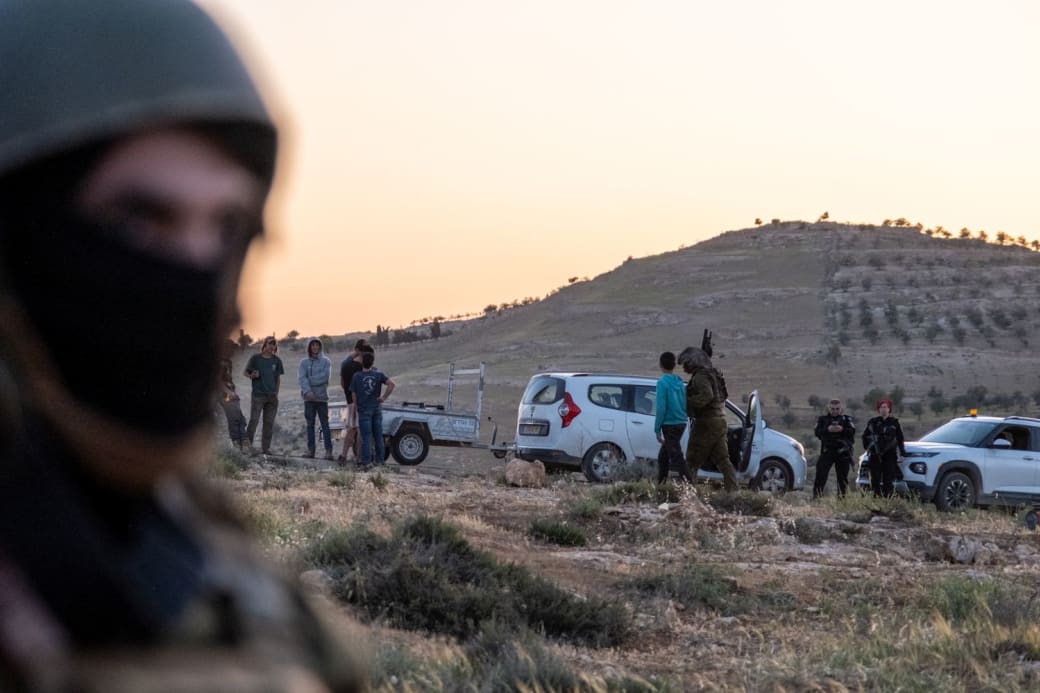
16-year-old Elias is arrested after his father was shot.
© Aidan Frere-Smith
Settler violence or state violence?
Sheikh Saeed’s story is not an isolated case. Settler violence - especially in Masafer Yatta - is not new. In March, the Oscar-winning documentary No Other Land spotlighted the harsh reality in the hilly region, where settlers and the Israeli army have been trying to drive out Palestinians for years. But since the war in Gaza, it has skyrocketed.
Between 7 October 2023 and 31 December 2024, the United Nations recorded 1860 cases of settler violence, the highest figure ever. In 2022, it averaged two attacks per day, and twice as many in 2024. At least 300 Palestinian families were displaced, a total of 1762 people, including 856 children.
This escalation is linked to an explosion in the number of illegal outpost farms, makeshift Jewish tent camps on Palestinian land. According to Israeli watchdog Peace Now, some 59 outposts were set up in 2024, up from an average of seven a year.
‘Since the war in Gaza, we clearly see a coordinated strategy by Israeli politics, the settler movement and the army to ethnically cleanse and annex the West Bank’, said Ubai Al-Aboudi, director of the Bisan research centre, in Ramallah.
Since taking office in 2022, the far-right Netanyahu government has made no secret of its plans to swallow up the area, against international law. Fanatical settler militias (dutch), including the infamous “hilltop youth”, play a leading role in this. They are the shock troops who occupy Palestinian land by establishing outpost farms, from where daily harassment and sometimes deadly pogroms are organised. The IDF (Israeli army) provides backing and the government covers the legislative and institutional flank.
Meer lezen over geweld op de Westelijke Jordaanoever?
With ministers like Bezalel Smotrich and Itamar Ben-Gvir, two of the settler movement’s most extremist leaders are in the cockpit. They have Netanyahu in their grip. If they bring down the government, he may fly behind bars for corruption. When settlers reduced a Palestinian village to ashes just after the government took office, Smotrich said it should be "wiped off the map".
Ben-Gvir had a picture hanging in his living room of "his hero" Baruch Goldstein, a terrorist who shot and killed 29 Palestinians during prayer. The loudmouth politician himself was also condemned in Israel for terrorism and racism. It is mainly under the influence of people like Ben-Gvir that the rights and lives of Palestinians in the West Bank have rapidly declined in value.
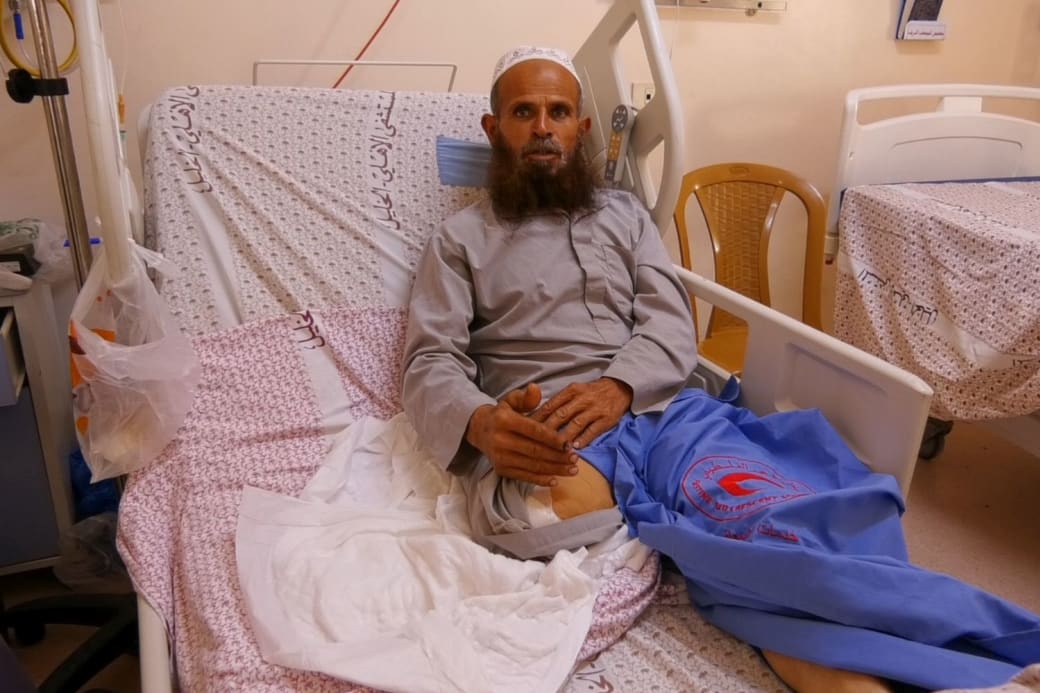
Sheikh Saeed in hospital in Hebron after his release. His leg had to be amputated due to extensive damage to the artery.
© Willem De Maeseneer
From occupation to annexation
The commander in charge of civil affairs in the West Bank reports directly to Smotrich. ‘He is a puppet of this religious fanatic’, Al-Aboudi explains. Through this system, the settler movement decides on everything from building permits to who goes to jail.
‘At the same time, Ben-Gvir has turned the Israeli police into his personal militia’, says Al-Aboudi, with Israeli media often describing the powers of both ministers as ‘the equivalent of giving a jerry can of petrol to a pyromaniac’.
Even months before 7 October, the Israeli government began paving the way for the annexation of the West Bank. Now that all attention is focused on Gaza, those plans are being implemented undisturbed and at a hellish pace.
In November, for instance, Netanyahu replaced Defence Minister Yoav Gallant with dog-eared supporter Israel Katz. Gallant was one of the few government members who opposed full annexation. Since the Hamas attack, security minister Ben-Gvir says he has already distributed 120,000 firearms to West Bank settlers. The transport minister recently donated more than 20 all-terrain vehicles to residents of illegal outposts in Masafar Yatta "to more easily enter Palestinian land".
An avalanche of bills aimed at structurally changing “the DNA” of the West Bank followed during the winter session of the Knesset. Read: fewer Palestinians and more Jewish settlements.
All that culminated last Tuesday (13 May, ed.) in probably the most important step towards the official annexation of the Palestinian territory yet: for the first time since the occupation began in 1968, Israel is going to officially register pieces of land in the Palestinian West Bank as Israeli. This means that Israel no longer occupies those areas militarily, as it does now, but actually takes them over.
Under international law, this is forbidden because it is Palestinian territory. Registering land as Israeli would therefore mean that many Palestinians would officially lose their land. What has been in practice for years through expropriations and settler violence is now being institutionalised.
Israeli ministers themselves say this must happen to prevent a Palestinian state from ever emerging. According to researcher Al-Aboud, it is clear: ‘This system is explicitly designed to drive Palestinians off their land forever.’
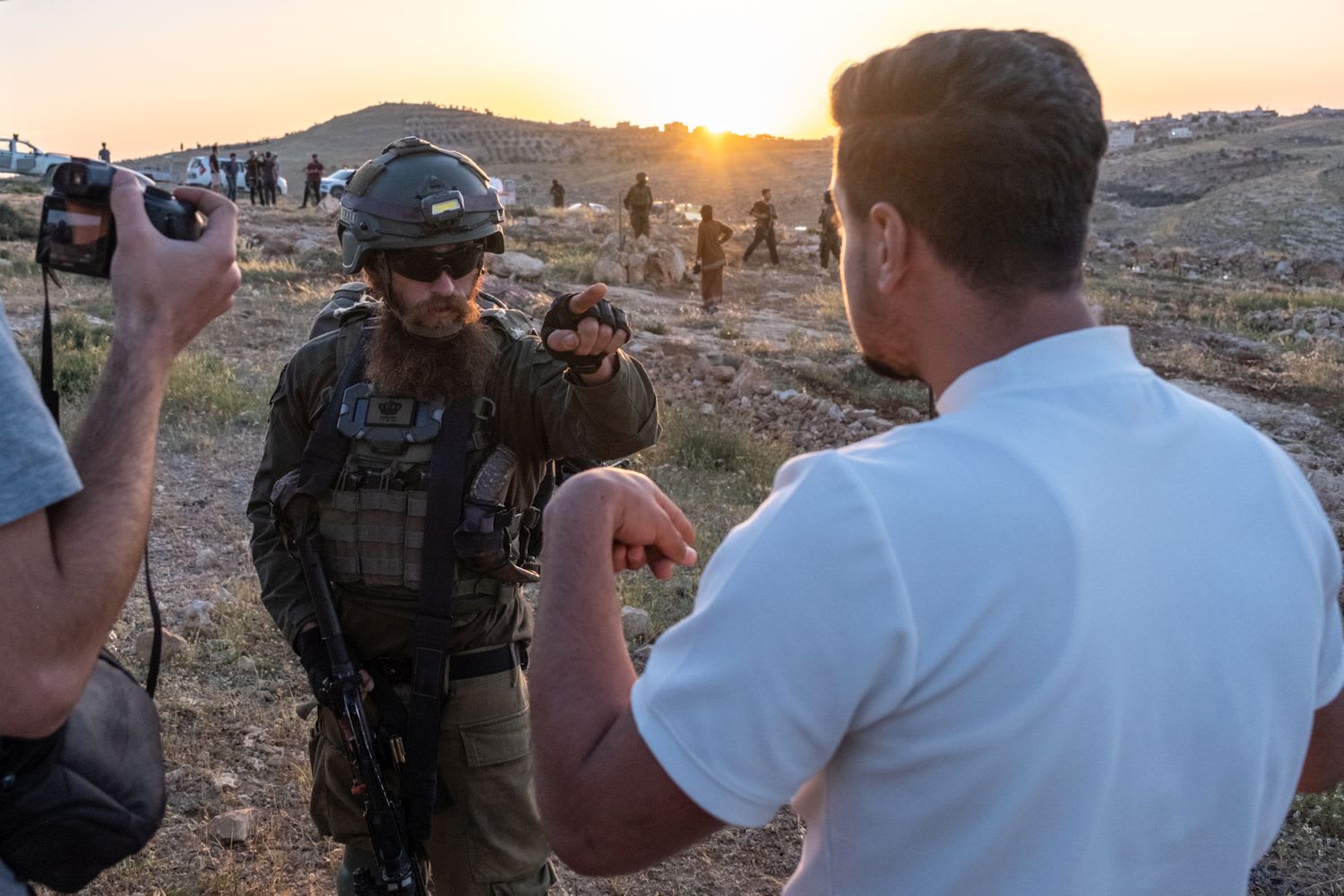
Soldiers confront local Palestinians after the shooting and chase them away.
© Aidan Frere-Smith
Back to the scene of the crime
Sunday 20 April, three days after the shooting, I am on my way to Tuwani in Masafer Yata to speak to Sheikh Saeed’s family about the incident. When we are almost in the village, we get word that Binyamin Bodenheimer, the settler who shot Saeed, has resurfaced.
A teenager from the so-called “hilltop youth” – a group of fanatical settlers who revel in extremist politicians like Ben-Gvir – is throwing stones and shouting curses at the family’s house. Bodenheimer himself, again heavily armed, stands hidden behind a tree.
As soon as Saeed’s family comes out to chase the boy away, Bodenheimer emerges and points his rifle at them.
Minutes later, we see Palestinians and international activists flocking around the house to provide a protective presence. I see Bodenheimer with his machine gun type M-16 and ask a volunteer if he is a soldier or settler. ‘These days there is little difference between the two’, the young lady replies in a British accent. Soon, two Israeli army armoured cars and two police jeeps arrive in a cloud of dust.
Instead of tackling Bodenheimer, the soldiers converse amiably with him. Bodenheimer points at us and at the Palestinian residents, as if giving orders to the soldiers. A few minutes later, the Palestinian villagers, the volunteers and myself are chased away by the soldiers with intimidation. The intruder is allowed to stay in Sheikh Saeed’s yard.
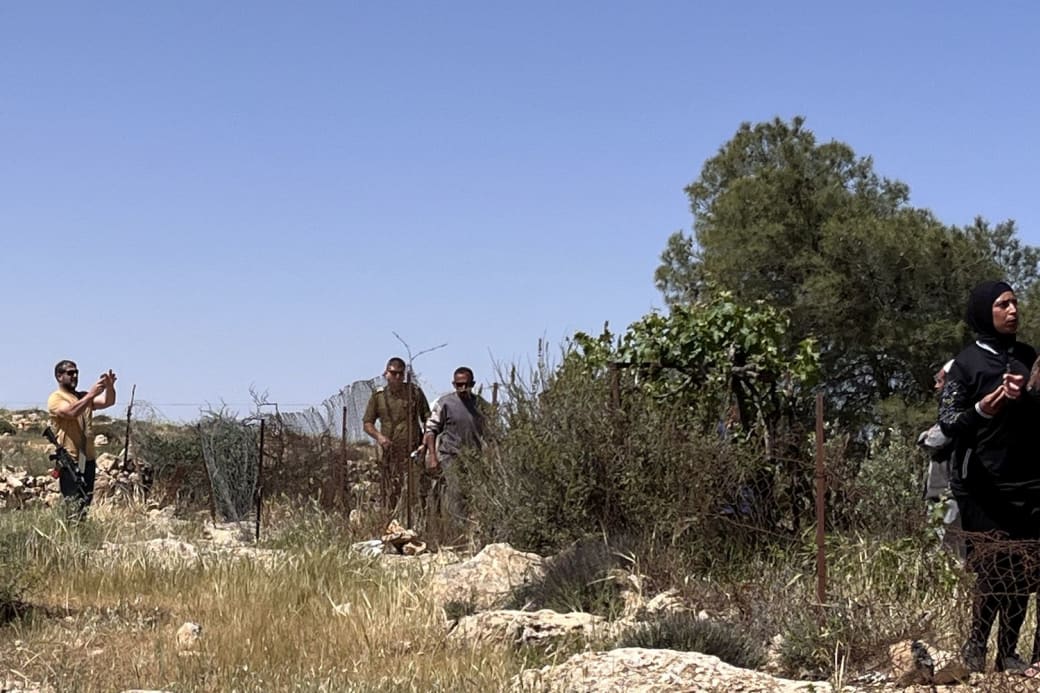
Three days after the shooting, Binyamin Bodenheimer returns to Sheikh Saeed's farm to threaten the family.
© Willem De Maeseneer
Line between settlers and soldiers blurs
When Joel Carmel was stationed near Masafer Yatta during his officer training in 2014, he immediately noticed the great influence armed settlers had on soldiers. Officially, ‘civilian security coordinators’ like Bodenheimer have only limited powers within the boundaries of their settlement.
But Carmel saw how they asserted their authority throughout the region. ‘They determined where Palestinians were allowed to enter and instructed soldiers on who to arrest. Inexperienced soldiers are completely dependent on their connections and terrain knowledge’ says the ex-military man.
He saw how militant settlers, many of whom believe they have a biblical right to the area, abused their power to redraw the boundaries of their settlement or outpost.
During his training, Carmel had to patrol around an Israeli settlement. The civil security coordinator took his unit on a tour. ‘If that Palestinian farmer comes up to here, you must stop him’, he ordered. He pointed out which piece of land was “theirs” and which was not. ‘But his directions did not match the official settlement boundaries at all.’
They often even have access to the IDF’s radio system, making them aware of all military communications in their region.
‘Officially they have no position or authority in the army, but in practice they have the authority of an officer, and even a fairly senior one’, Carmel said.
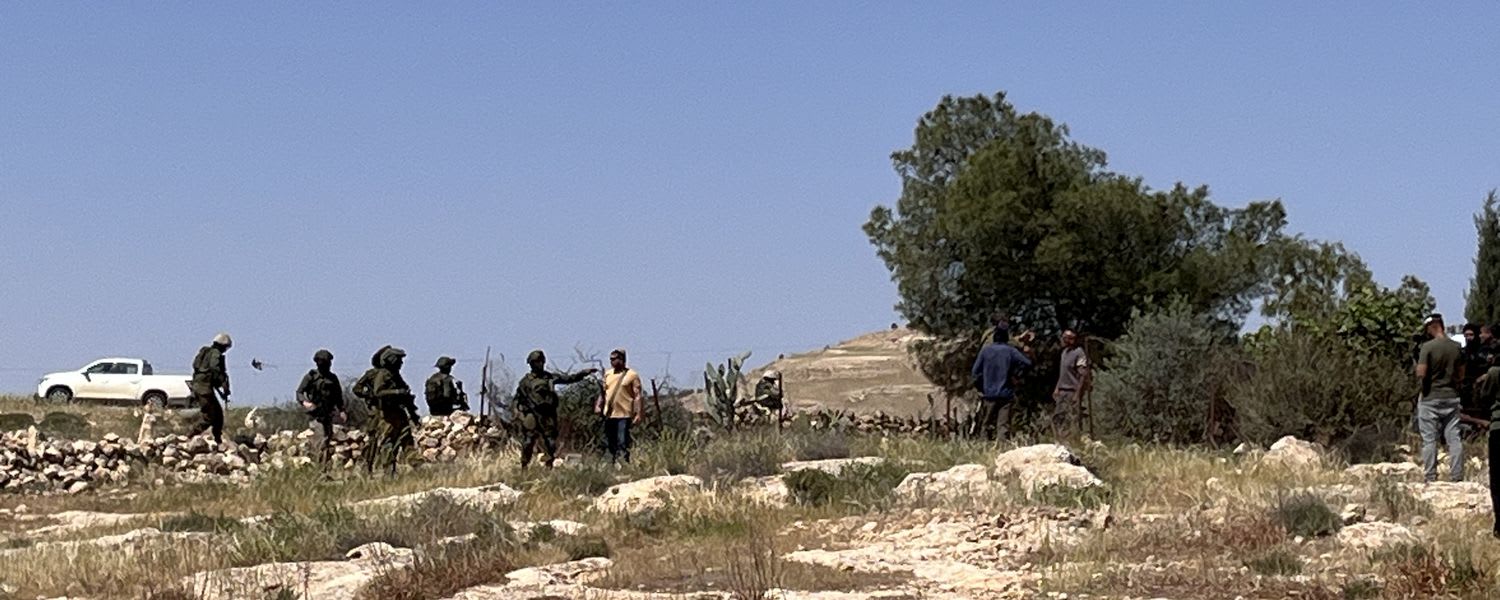
Israeli soldiers chat with Bodenheimer, who attacked Saeed's farm. Palestinians are violently chased away.
© Willem De Maeseneer
Silent coup
Joel Carmel grew up in the British Jewish community, but moved to Israel after high school, joined the army and served as an officer in the West Bank.
During his military service, he saw things that convinced him that the promised security would not come due to the ongoing occupation. Today, he works for Breaking the Silence, an organisation of former soldiers with conscientious objections that confronts Israelis with how Palestinians live under occupation.
According to Carmel, the dominance of settlers within the army increased sharply over the last 20 years. After Israel’s withdrawal from Gaza in 2005, which included the evacuation of settlements, settlers felt betrayed by their government.
An influential rabbi, Yoel Bin-Nun, suggested that simply building new settlements was not enough. They also needed to "colonise the hearts of the Israeli people" and embed their ideology in all key institutions, especially the media, politics and the army.
This kicked off a successful campaign – observers speak of a covert coup – to gain influence in Israeli society as well as in the army. Young people were prepared for a military or political career through youth movements. With results: one in five soldiers recently voted for the extremist Ben-Gvir, who just a few years earlier was a fringe figure.
So in 20 years, the settler movement has grown from a rather marginal group within Israeli society, due to their extreme religious and Zionist views, to a leading movement in the highest echelons of power.
‘Their agenda determines everything. Since 7 October 2023, Palestinians have hardly been allowed to harvest their olives. This hardly serves any military purpose, but only the interests of settlers’, says Carmel.
Another consequence is the relaxation of shooting rules. ‘Settlers with high military positions deliberately create a climate of total impunity for soldiers with loose fingers’, says Carmel. The result: never before have Israeli bullets killed more Palestinians in the West Bank than in the past 18 months.
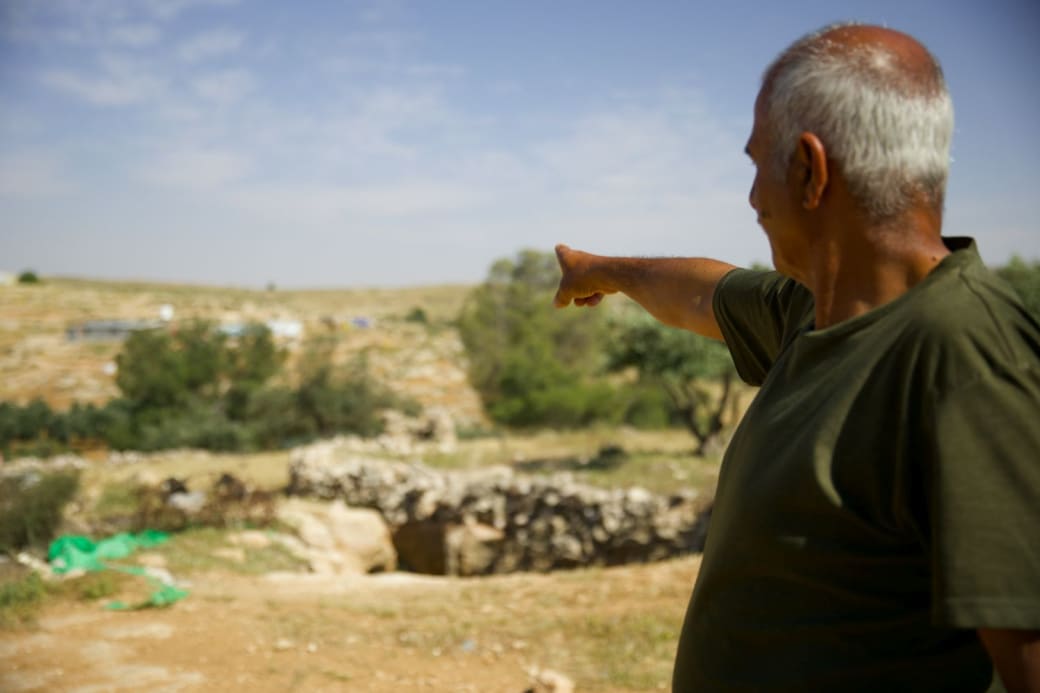
A resident of Susiya points to two new Israeli outposts on the hilltops surrounding the village.
© Meras Alazza
Pogrom
Back in Masafer Yatta, 17 April. After being chased out of Sheikh Saeed’s yard by Israeli security forces, we trek to nearby Susiya. Israel declared the Palestinian village state land. Residents there now live mainly in caves and temporary shelters. A violent pogrom took place here at dusk in late March.
Footage that circulated the world showed a group of hooligans, armed with clubs, knives and at least one machine gun, threatening and attacking five activists. They receive fists and are pelted with stones.
A few moments before, the attackers had severely beaten Oscar winner Hamdan Ballal, the director of No Other Land who lives in Susiya. They beat him repeatedly on the head until blood gushed on his doorstep.
When Israeli soldiers arrived at the scene, they did not target the attackers but took Ballal and two other villagers away, handcuffed and blindfolded.
We meet up with Nasser, a Palestinian shepherd and grape grower. On arrival, we see him embroiled in a heated argument with Israeli police and a settler carrying a flock of sheep. Together with his friends and family, we watch the discussion from a distance. Soon the good-humoured forty-something returns.
The Israeli shepherd of a nearby outpost had treated his flock to Nasser’s grapevines. Nasser had called the (Israeli) police. This time things ended well, the policemen asked the settler to leave.
Before letting Nasser go, however, they asked him where ‘his son, the terrorist’ was. ‘My son has nothing to do with the resistance, it was an implicit threat that they will come and pick him up soon’, the Palestinian said resignedly. The officers also asked ‘how was his car?’ Nasser’s car recently burned out during a nighttime raid with Molotov cocktails.
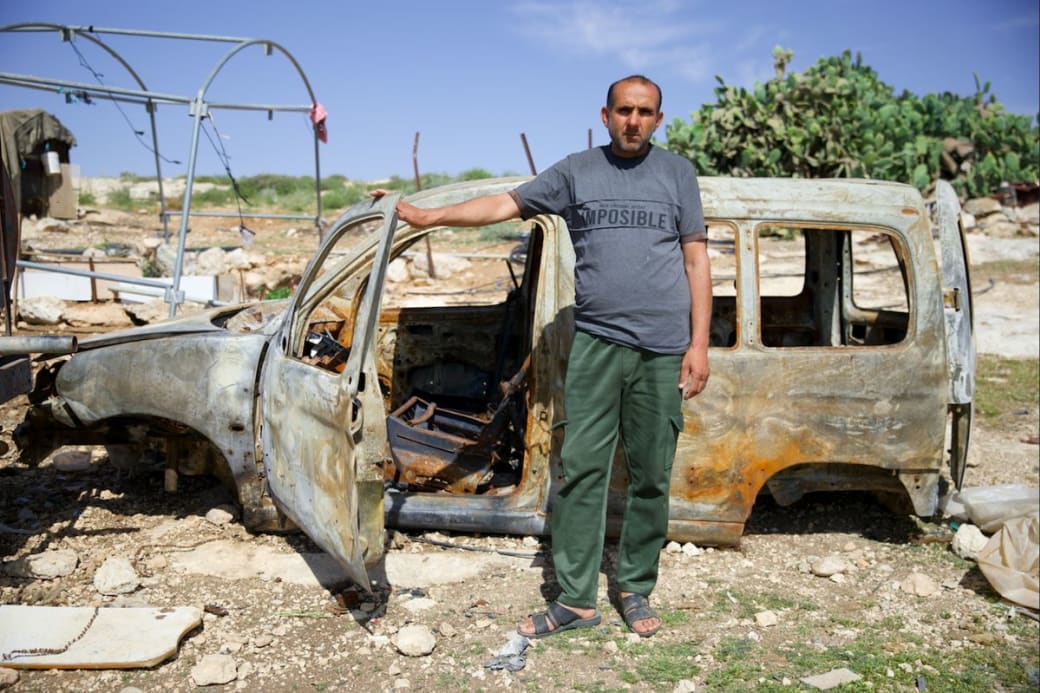
Nasser next to his burned-out car.
© Meras Alazza
Daily occurrence
Experiencing two incidents in one day is no coincidence. The harassment and violence are daily occurrences for the residents of Masafer Yatta.
‘We get up early in the morning to work our land. If they see us leaving the village during the day, they invariably come driving down their hill to harass us’, says the farmer.
Susiya lies on an elevated plain and is surrounded by hilltops, on which there is one settlement and two outposts, with flying Israeli flags. Residents feel constantly spied on.
Nasser, his 17-year-old son and an elderly neighbour recount how they were beaten by hilltop militias last year. The older man’s donkey was even kidnapped.
‘What can we do?’, replies Nasser when I ask how they cope with the stress of being constantly besieged. ‘Leave...’, I reply. They look at me as if I am crazy, leaving their native land is unthinkable.
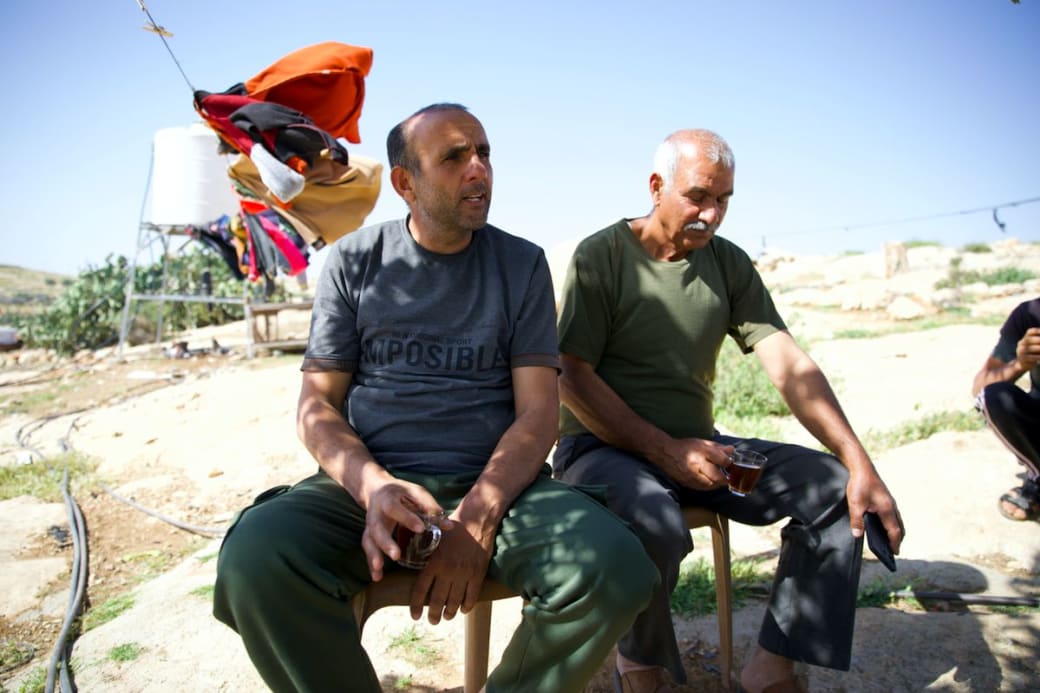
Nasser and his neighbor in the village of Susiya.
© Meras Alazza
Domino effect
‘The attacks will only increase because Israel has no accountability’, says researcher Ubai Al-Aboud from Ramallah.
‘Only if European countries finally decide to enforce international law can this change. ‘A single arrest of an Israeli minister or soldier could set in motion a domino effect’, he thinks. Then he refers to Bart De Wever, who would not arrest Netanyahu despite the international arrest warrant.
‘Israelis also need to understand that these kinds of authoritarian movements are reluctant to surrender their acquired power. Once these armed militias are sufficiently organised, they will take over not only the West Bank but also Tel Aviv’, he warns.
(Originally published in Dutch on may 21, 2025)
 This article was translated from Dutch by kompreno, which provides high-quality, distraction-free journalism in five languages. Partner of the European Press Prize, kompreno curates top stories from 30+ sources across 15 European countries. Join here to support independent journalism.
This article was translated from Dutch by kompreno, which provides high-quality, distraction-free journalism in five languages. Partner of the European Press Prize, kompreno curates top stories from 30+ sources across 15 European countries. Join here to support independent journalism.
The translation is AI-assisted. The original article remains the final version. Despite our efforts to ensure accuracy, some nuances of the original text may not be fully reproduced.
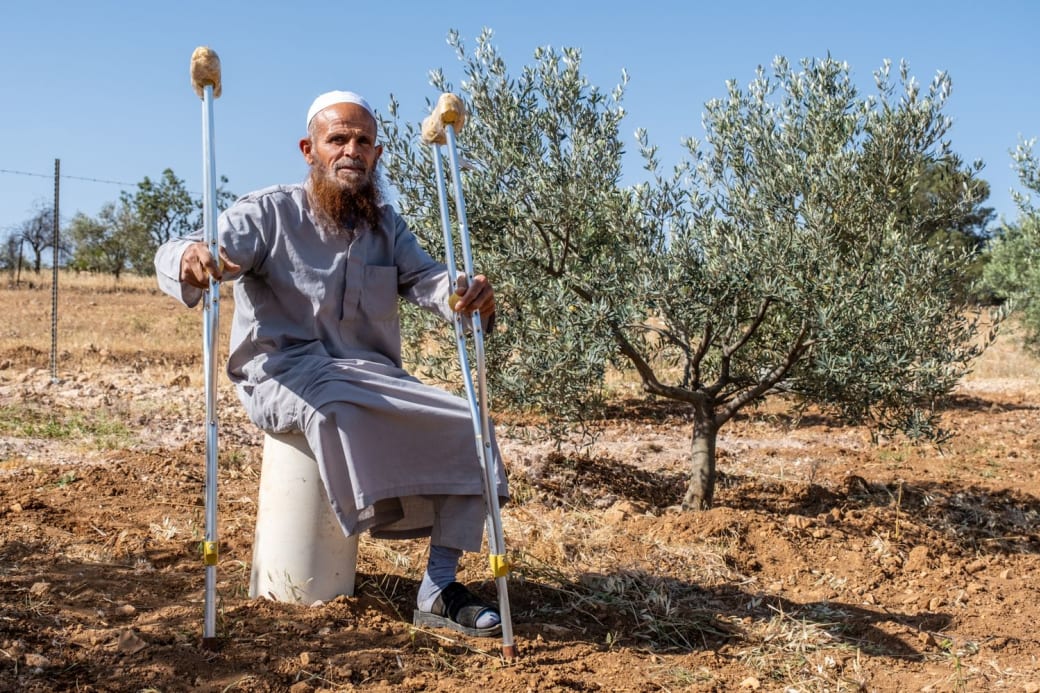
Sheikh Saeed is now back in his olive grove, with one leg down but his resilience unaffected.
© Aidan Frere-Smith
If you are proMO*...
Most of our work is published in Dutch, as a proMO* you will receive mainly Dutch content. That said we are constantly working to improve our translated work. You are always welcome to support us both as a proMO* or by supporting us with a donation. Want to know more? Contact us at promo@mo.be.
You help us grow and ensure that we can spread all our stories for free. You receive MO*Magazine and extra editions four times a year.
You are welcome at our events free of charge and have a chance to win free tickets for concerts, films, festivals and exhibitions.
You can enter into a dialogue with our journalists via a separate Facebook group.
Every month you receive a newsletter with a look behind the scenes.
You follow the authors and topics that interest you and you can keep the best articles for later.
Per month
€4,60
Pay monthly through domiciliation.
Meest gekozen
Per year
€60
Pay annually through domiciliation.
For a year
€65
Pay for one year.
Are you already proMO*
Then log in here
